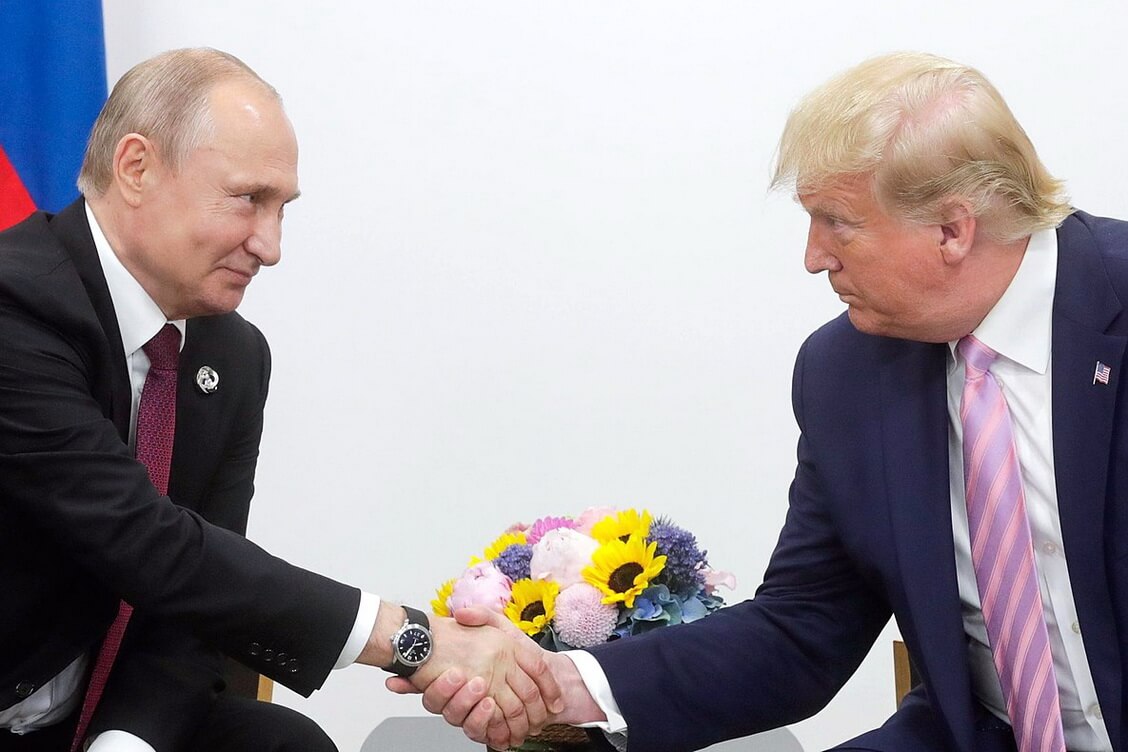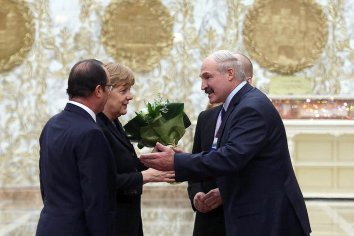On the third anniversary of Russia’s full-scale invasion of Ukraine, Russian forces appear to hold the upper hand on the battlefield. The prospects for democratic change in Belarus have dimmed, while Alaksandar Łukašenka’s position has strengthened.

Zelensky labeled “dictator” by Trump
US President Donald Trump has ramped up pressure on Kyiv, demanding unfavorable peace terms and a minerals deal. Ukrainian President Volodymyr Zelensky rejected Trump’s offer on February 23, stating that he would not sign an agreement that would burden future generations.
Angered by the rejection, Trump labeled Zelensky a “dictator,” despite the latter’s proposal to step down in exchange for peace or for Ukraine’s membership of NATO. In contrast, Russian President Vladimir Putin has received only praise from the US president.
Trump has yet to engage with Łukašenka, but the Belarusian leader seems to approve of the remarks denigrating the Ukrainian president. Previously, Łukašenka was mocked for allegedly securing only 3 percent of the vote in the 2020 elections. Now, Trump claims that Zelensky’s approval rating is a mere 4 percent, although the Kyiv International Institute of Sociology reported it at 57 percent in February.
If the United States cuts aid to Ukraine, the country may struggle to fend off Russian forces. While the European Union has pledged support, its defense sector remains underdeveloped, with relatively low defense spending. Additionally, Ukraine faces manpower shortages.
European governments are increasingly focused on preparing for a potential war with Russia on EU soil, a scenario that many analysts and intelligence agencies predict will be inevitable in the coming years.
Zelensky proposes European security line
During his keynote speech at the Munich Security Conference on February 15, Zelensky proposed a military defense line extending across the eastern borders of Ukraine, Belarus, Finland and the Baltic states.
“My proposal—Ukraine’s eastern border, Belarus’ eastern border, the eastern borders of the Baltic states, Finland’s eastern border—that is the strongest security line for all of us in Europe, because that is the line of international law,” he said.
The Belarusian opposition supported this idea, but its feasibility remains questionable.
For Belarus to be part of this buffer zone, it must first rid itself of Łukašenka’s regime and break free from Moscow’s influence. However, as Zelensky pointed out, Putin considers Belarus part of Russia and is unlikely to relinquish his hold on it.
The West failed to entice Belarus away from Russia even when Łukašenka still had some room for geopolitical maneuver. The EU’s Eastern Partnership program, which aimed to bring six countries closer to Europe, failed completely in Belarus. This failure was due not only to Moscow’s resistance but also to Łukašenka’s unwillingness to embrace European values.
US strategy on Belarus may fail as Moscow’s grip tightens
An attempt by Washington to sow discord between Minsk, the Kremlin and China during Trump’s first term ended in failure.
In 2019, Łukašenka refused to sign “roadmaps” for deeper integration with Russia, angering Putin. In response, Russia halted oil deliveries to Belarus on January 1, 2020. US Secretary of State Mike Pompeo visited Minsk to offer alternative supplies, but the deal was suspended following the brutal suppression of protests against election fraud in 2020.
Currently, according to The New York Times, Washington may ease sanctions in exchange for the release of a significant number of political prisoners. US Deputy Assistant Secretary of State Christopher Smith, who visited Minsk for talks with Belarusian officials, later told a closed briefing in Vilnius that one of the US’s goals was “to give Mr. Łukašenka some breathing room outside Russia’s orbit of influence.”
However, Washington’s goal seems unrealistic, despite the current administration’s pragmatism. While trading political prisoners for sanction relief is possible, expecting Łukašenka to extricate himself from Russia’s orbit is naïve. As long as Moscow supports him, he can endure both internal and external pressures. The January presidential election in Belarus passed without protests, thanks to years of relentless repression.
The hope that the Ukraine-based Kastuś Kalinoŭski Regiment might assist the opposition in overthrowing the regime has also waned.
Ukraine will likely face a ceasefire under unfavorable terms and must prepare for a renewed Russian onslaught.
Zelensky’s plan: unrealistic confrontation line
Zelensky’s proposal to draw a line of confrontation between the democratic world and the Russian empire along Belarus’ eastern border is unrealistic.
Furthermore, democracy itself faces significant challenges. Trump is working to expand his powers and undermine the system of checks and balances in the United States. His assertiveness on the international stage, including ideas about annexing Canada and Greenland, speaks volumes. It is no surprise that Łukašenka has praised him, sensing a kindred spirit.
At the Munich Security Conference, US Vice President JD Vance not only gave a humiliating lecture to Europeans but also expressed support for far-right groups in Germany. The Western world is in a deep crisis, and transatlantic unity is fraying.
Many politicians, media outlets and social media users fear that Ukraine has been betrayed and may be sacrificed.
Cichanoŭskaja: Europe risks empowering Łukašenka and Putin
Speaking at the Munich Security Conference, opposition leader Śviatłana Cichanoŭskaja warned that concessions to Ukraine would only embolden Łukašenka and Putin, allowing them to tighten their grip on Belarus.
Unfortunately, her assessment seems all too plausible at the moment, though not all decisions have been made.
Trump may change his policy on Ukraine if he cannot reach a deal with Putin. Europe can also demonstrate resolve, mobilize and support Ukraine. Politicians are already discussing sending a peacekeeping force to Ukraine.
However, one should not expect miracles. A ceasefire will likely divide the sides along the front line, with a prolonged stalemate in store.
Putin does not have the resources to directly attack NATO, even after the alliance has been weakened by the rift between Washington and Europe. A cold war between Russia and Europe seems more likely. Belarus may find itself behind the iron curtain as it remains tethered to Russia, and the world could undergo significant changes. Belarusian pro-democracy forces must reconsider their strategy, as the current rhetoric and wishful thinking have become increasingly irrelevant.
In the lead-up to World War II, the West tried to appease Adolf Hitler by giving up Czechoslovakia. That did not prevent the war, and for a time, it seemed that the Nazis would conquer the world. But in the end, Germany and its allies were defeated.
Let us remember that victory over evil, which once seemed impossible, can be achieved.
